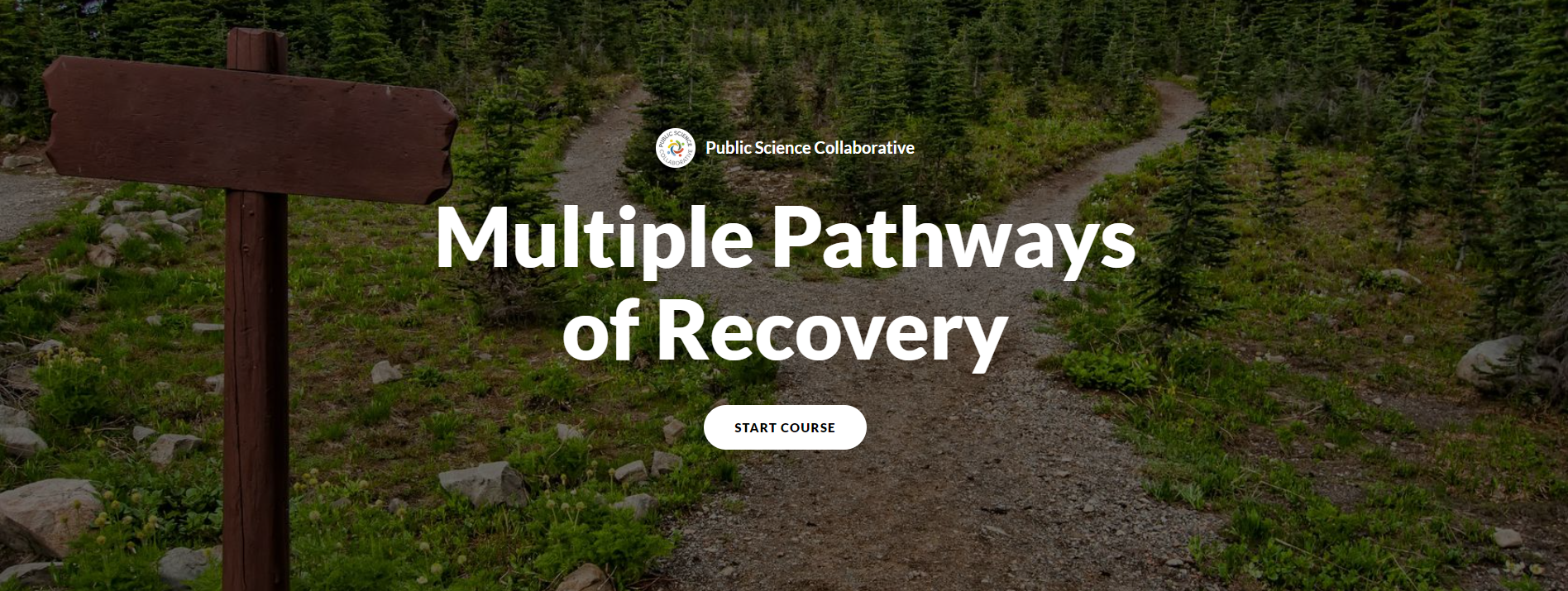Multiple Pathways to Recovery
More Than One Way
Recovery looks different for everybody. As we honor that there is more than one way to find and maintain recovery, we also honor the diversity of individuals and their lived experiences. Gaining understanding of the various pathways of recovery can help you as you support others' recovery journeys. Whether it's through storytelling, medications for opioid use disorder, mutual aid meetings, a natural approach, or something else - we can celebrate all pathways of recovery.
On this page, you’ll find one of our self-paced trainings. This short training (15-20 minutes) focuses on celebrating and exploring various recovery pathways. During the interactive training, you will also have an opportunity to review several of the resources included on this page. You can either explore the training by clicking the hyperlinked title or the preview image to open the training in a separate webpage.
You'll also find resources that discuss the key elements of the multiple pathways of recovery. You can find the resources on this topic and a description of each item in the list below. You can click on the title of the resource to jump down to it on the page, or simply scroll down to see previews of each resource.
Available Resources
-
Interactive Training
- Multiple Pathways of Recovery - Self-paced Training (~20 min)
-
Training Guide
- Multiple Pathways Group Activity (2 pages)
-
Articles and Blogs
- Bridging the Gap: Embrace and Understanding of Many Pathways of Recovery (12 pages)
- CCAR: Recovery Storytelling - A Creative Pathway
- CCAR: Multiple Pathways
- CDC: Medications for Opioid Use Disorder (MOUD) Study
- Medication for Opioid Use Disorder (MOUD)
- SAMHSA Resources on Medications for Opioid Use Disorder (MOUD)
- The Portrayal of Multiple Pathways of Recovery in the Writings of Alcoholics Anonymous Co-Founder Bill Wilson
-
Videos
- CCAR: Supporting Multiple Pathways (~1 hour)
- CCAR: Basics of Psychedelic-Assisted Recovery for Professionals (~1.5 hours)
- CCAR: Recovery and the Creative Process (~1.5 hours)
- CCAR: "The God Thing" with John Schwartz (~1.5 hours)
- CCAR: The Write Recovery (~1 hour)
- CCAR: Mindfulness and Recovery Coaching (~2 hours)
- Sound Healing: Holistic Recovery Approach (~1 hour)
- CCAR: A Review of Peer Support Pathways (~1 hour)
- Basics of Psychedelic-Assisted Recovery (~1.5 hours)
- Wellbriety Introduction (~1 hour)
- Approach to Native American Recovery (~30 mins)
- CCAR: 12-Steps and Recovery Coaching (~1 hour)
- Harm Reduction as a Recovery Pathway (~1 hour)
- Healing-Centered Engagement (~1.5 hours)
This interactive training focuses on celebrating and exploring various recovery pathways. It also prompts personal reflection on how you support recoverees. The training module is self-paced (meaning you can complete it anytime and at your own pace), and it typically takes 15-20 minutes for participants to complete. To get started with the training, you can click on the title or on the preview image to open it in a separate window.
This CCAR group activity training guides participants through what it means to have multiple recovery pathways. Click here for an editable version of this document.
Articles and Blogs
This white paper (12-pages) by Michael Miller discusses the multiple pathways approach. It discusses various pathways and includes a call to action for the recovery community.
This blog post from CCAR's website explores how storytelling can strengthen or enhance your recovery. It explores the ways storytelling unlocks new perspectives and creates connections.
This article from CCAR lists some of the pathways of recovery. From 12-step, to non-religious, to medication-assisted treatments, this article provides a non-exhaustive list to help you get started in exploring the different recovery pathways.
This article from the Washington State Healthcare Authority gives an overview of MOUD. This includes information for providers, as well as a brief understanding of which medications are often used in this pathway.
This research article from the CDC website explores the key outcomes of medications for opioid use disorder, as well as why various medications may be prescribed. In its entirety, this article aims to provide research for evidence-based practices in the MOUD space.
SAMHSA provides several different pages of resources for MOUD treatment. This includes resources for providers, training requirements, and various resources and information.
This article by William White & Ernest Kurtz looks at the writing of alcoholics anonymous co-founder Bill Wilson. It shows the presence of the Multiple Pathways of Recovery mindset in his writing. This article is a must-read for those who found recovery through 12-step programs.
Videos
This video by CCAR discusses how to support multiple pathways throughout your RCC.
Learn more about psychedelic-assisted recovery pathways here!
This CCAR video describes how the creative process can be a part of someone's recovery journey.
This CCAR webinar explores religion as an available option for people in recovery.
Watch this video with author Robin H. Clare to learn more about how writing and recovery can interact.
This video discusses how mindfulness and recovery coaching tend to go hand-in-hand.
This video discusses how sound can assist in recovery healing through a variety of paths.
This video discusses some best practices when supporting multiple pathways as someone in peer support.
This video from CCAR discusses the role that Psilocybin can play in a person's recovery journey.
This video centers around Wellbriety's medicine wheel and 12-Step Native American peer-driven recovery program.
J. Carlos Rivera discusses the importance of holistic recovery in Native American spaces in this video.
This video discusses the strengths, as well as the weak points, that come from a 12-step background in coaching.
This CCAR video explores how harm reduction can play a role in recovery pathways.
This video focuses on the shift from "trauma-informed care" to "healing-centered engagement."

